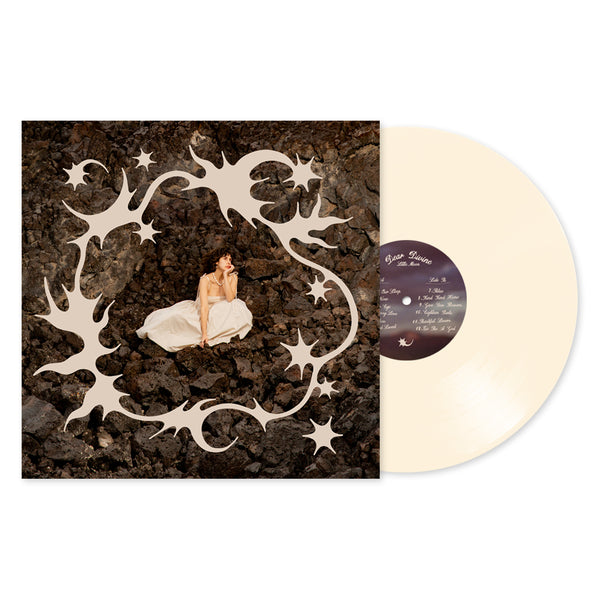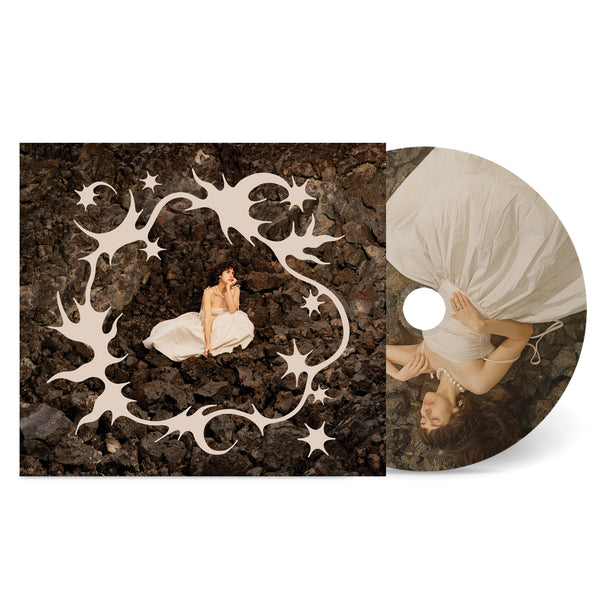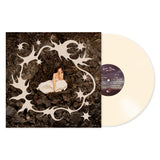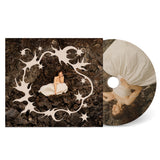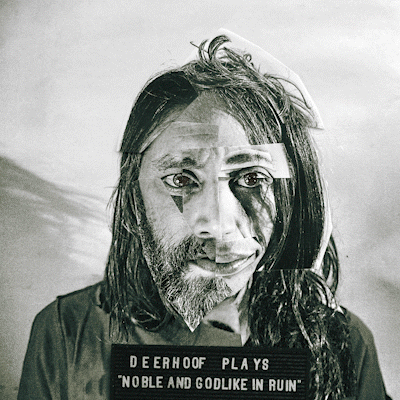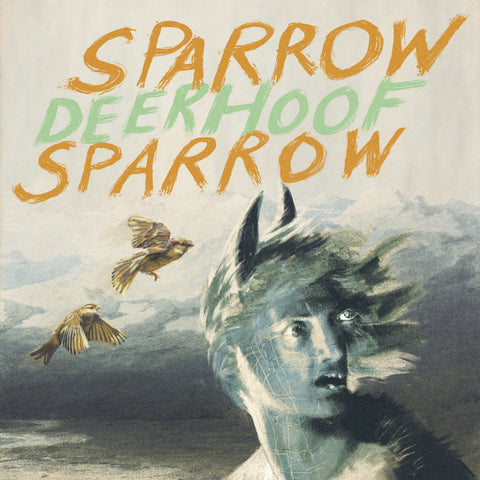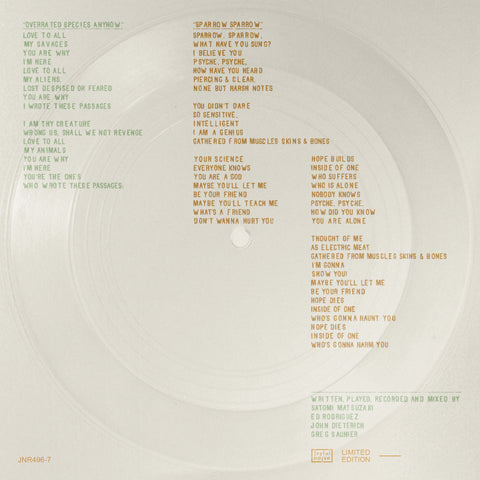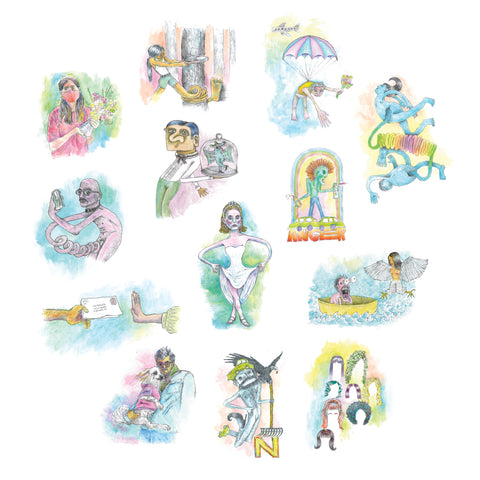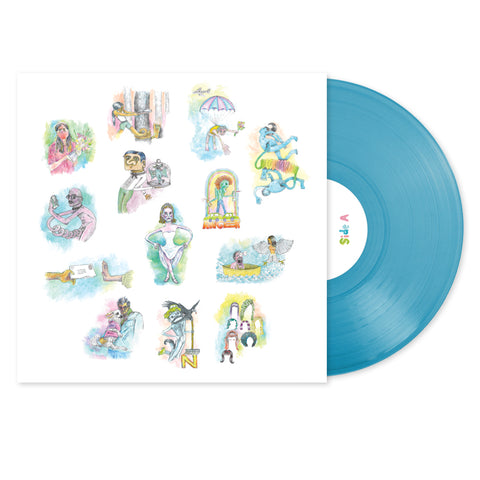$ 27.00 USD
SOLD OUT
>
1. we fall in our sleep
2. now
3. wonder eye
4. messy love
5. for you
6. holy and sweet
7. blue
8. kind, kind home
9. give you flowers
10. eighteen parts
11. bashful lovers
12. to be a god
Credits:
Music by Emma Hardyman, Produced by Bly Wallentine and Emma Hardyman
Mixed and Engineered by Bly Wallentine, Mastered by Kramer, with additional mastering by Lindenfield
Art Direction and Album Design by Ty Davis
Photography by Mario Alcauter
Album Midwife, Sequencer, and Adviser: Karl Hofstetter
Recorded at The Toaster Oven
Bly Wallentine: synths/programming, bass guitar, percussion, bowed banjo, horns, organ, melodica, clarinet, toy piano, acoustic guitar, backup vocals
Bryn Huntington: clarinet and bass clarinet
Bridget Jackson: harp
Chris Themwell: drums
Cassidy Wake: violin
Anne Montgomery Blake: cello
Hunter Montgomery: viola
Nathan Hardyman: electric guitar and acoustic guitar, backup vocals
Katy Ducos: trombone
Community of choir friends: backup vocals
All her life, Emma Hardyman has wrestled with contradictions. After all, she was practically rendered a living, breathing contradiction the moment she was born into her half-Peruvian, half-white working-class Mormon family. Hardyman never quite fit in, often feeling ostracized no matter who she interacted with, and understandably found refuge in the arts—but even the way she obtained one of her unique talents feels contradictory. As children of musical parents, she and her siblings poked fun at the vocal warmups their father would teach his students, but amidst these jokes, one brother frequently challenged Hardyman to sing above the piano’s highest note, unwittingly helping to shape her gorgeous, unusually high vocal range. She was also homeschooled and the youngest of seven, which fueled her nervousness and social anxiety, so when encountering stressful situations, she often sang church hymns to herself, leaning into absurdity when faced with fear.
In young adulthood, Hardyman felt increasingly disillusioned with Mormonism’s righteous black-and-white thinking, as well as its exclusionary elitism, and decided to leave the church. But she also acknowledged that the institution’s all-or-nothing philosophy had become a part of her, resulting in a considerable test of grace and unlearning. Throughout that process, she began to realize that those parts of her weren’t universally harmful, and she started to ponder what she could lose by denying certain aspects of herself. Hardyman also felt drawn to the ways mythology, spirituality, science and imagination give permission to revel in the beauty of paradoxes and regular introspection, and she now proudly relishes her role as a thoroughly contradictory being.
As the singer-songwriter and visionary behind Little Moon, the Provo, Utah-based avant-folk project, Hardyman uses music as an outlet to illuminate, intertwine and contort contradictions of all kinds. Following her self-released 2020 debut LP Unphased, Hardyman set out to write a romantic album about her newlywed husband Nathan, but the universe had other plans. After Nathan’s mother tragically passed away—a loss made more difficult by the fact that he had just informed her of his plans to exit the church—Hardyman recalibrated her vision and started work on a love-as-grief, grief-as-love album titled Dear Divine.
But Nathan is still weaved into the DNA of this LP, contributing vocals and guitar, in addition to a co-write on “wonder eye,” the explosive, ornately layered folk-pop song that won them the Tiny Desk Contest. Their relationship is also explored in Hardyman's mercurial vignettes, which ruminate on what it means to love deeply while also navigating your own insecurities and balancing autonomy with vulnerability. In this context, it becomes clear just how much love and grief have in common: the natural desire to romanticize, a yearning for a home-like calm and an urge to make sense of the inherently nonsensical. Affecting and chaotic, Dear Divine serves as a mirror for the darkest parts of ourselves, allowing us to examine our ego—not to dismantle it, but to better understand how we love, process adversity and move through the world.
While Unphased was a no-frills album recorded live without a click track, filled with songs shrouded in vagueness, Dear Divine is a vast, dense sonic world that mimics the grandiosity and delicate ebbs and flows of nature, peppered with intensely personal, complex lyrical motifs. Co-produced by Hardyman and Bly Wallentine (who also mixed the album and contributed banjo, horns, melodica and numerous other sounds), Dear Divine is laced with rich textures, from saintly harp plucks and field recordings of crunchy leaves to harshly distorted vocals and Zelda-inspired synths. The LP is also a product of the absurdity Hardyman holds dear, from jarring transitions, oddball effects and a goofy voicemail to perhaps the most absurd (and earnest) choice of all: closing the album with a touching phone-recorded acapella number—a courageous, soul-baring move given that it exceeds five minutes and is the record’s longest track.
Centering the classical music, folk, video game soundtracks and Tabernacle Choir hymns she grew up with, as well as ephemeral snapshots of personal significance, Dear Divine is an abundant tapestry of Hardyman’s life. As enlivening melodies radiate from a string trio, you can envision the classical music that thrums from her parents’ radio 24/7, as Hardyman sings in an otherworldly coo, you can imagine her younger self swooning over the tranquil records of Vashti Bunyan and Joan Baez, and as arpeggiated synths twinkle, you can visualize the enchanting kingdom of Hyrule from The Legend of Zelda: Ocarina of Time that she still adores.
“I wanted to play with the imaginative realms of fantasy, as well as imaginative realms of the sacred, like Gregorian choral hymnal music,” Hardyman says. “But I wanted to reimagine the sacred so it’s not ‘I must be righteous to please God,’ and instead more like, ‘You are who you are and that’s beautiful—not because you’re righteous, but because you’re a sinner and you mess up a lot, and you’re held in reverence for that.’”
Songs like the swirling chamber-folk “now” and the harmony-laden downtempo rocker “messy love” embrace the gloriously jumbled stew of life, with the former chronicling Hardyman’s arduous quest for love and trust—virtues the cultures around her often lacked—and the latter patiently navigating the ways romantic partners can mirror each other’s shortcomings. From references to her parents’ hardships (“holy and sweet”) to memories of her sister’s bicycle (“kind, kind home”), Dear Divine is bolstered by a loving examination of familial bonds. “blue,” a dainty, soundtrack-y synth-pop cut, recounts a near-death experience in which Hardyman’s sister rescued her from crashing waves, and “to be a god,” the hauntingly bare, pastoral closer, features a quote from Hardyman’s mother about flawed love as a manifestation of divinity.
As Dear Divine attests, Emma Hardyman may not have it all figured out, but that’s kind of the point. Through grief, faith crises and even all-encompassing love, she’s found the most wisdom in life’s maddeningly consistent inconsistencies, as well as the subtle ways one can cultivate a feeling of home. Dear Divine doesn’t take a red pen to life, it brings an open heart, an open mind and achingly beautiful, opulently weird folk songs.




